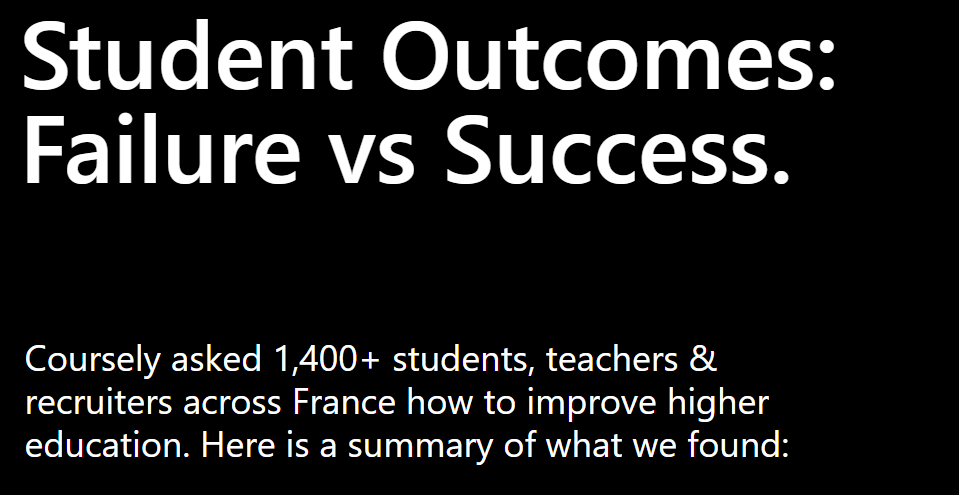Student Outcomes: Failure vs Success.
Coursely asked 1,400+ students, teachers & recruiters across France how to improve higher education. Here is a summary of what we found:
| Why students ‘fail’ in higher education and beyond | How students succeed | |
|---|---|---|
| Academic | Lack of direction or clarity in career path leading to a lack of interest in course topic, coursework, workload or teaching style Unreasonable or unrealistic expectations about university, teacher, course content, field of study, career trajectory… Poor study habits in high school that compound in higher education: procrastination, laziness, lack of focus or focusing on the wrong things, impulsiveness, multi-tasking | Awareness of one’s strengths and weaknesses and how to use them in one’s favor Resourceful with strong problem-solving, analytical and critical thinking skills leading to creative and innovative decision-making Love of learning with good research and note-taking habits and an ability to apply theory to practice |
| Personality & real-world | Poorly maintained mental and physical health such as lack of exercise and sleep and substance abuse Lack of accountability: blaming others, arrogant, self-centered, defensive, unable to handle criticism or question themselves, disrespectful Inability to adapt to a wicked, VUCA environment | Conscientious – organized, diligent, perfectionist, prudent & aware Goal-oriented with high self-motivation and self-discipline, strong work ethic, mature, positive attitude and ability to perservere Good time management, financial planning and professional networking skills Agreeable – forgiving, gentle, flexible and patient Able to work independently and collaborate in a team Emotionally intelligent and persuasive – effective writing and communication skills |
| Resources & Support | Family and financial difficulties Inadequate family and friends support system Culture shock – failing to build meaningful friendships and integrate into campus life and extracurricular activities Discrimination or bias Lack of quality mentorship, or wrong guidance Limited access to technology and study materials | Ability to network and build positive relationships with professors, advisors and fellow-students Willingness to seek help and accept constructive feedback Access to resources such as career services, mentorship and guidance from professors and professionals in their field |

